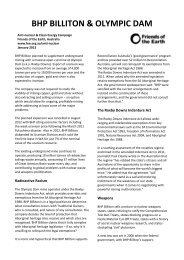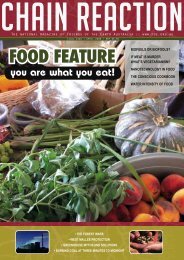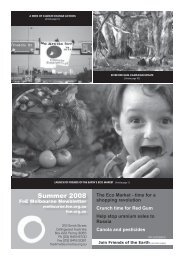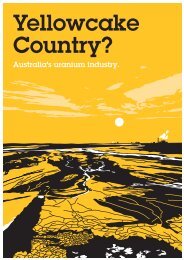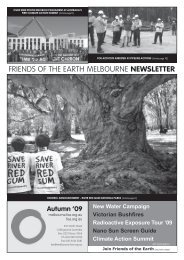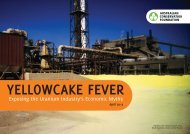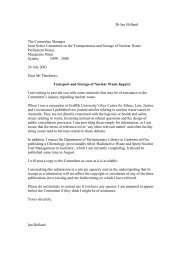Thirty Years of Creative Resistance - Friends of the Earth Australia
Thirty Years of Creative Resistance - Friends of the Earth Australia
Thirty Years of Creative Resistance - Friends of the Earth Australia
You also want an ePaper? Increase the reach of your titles
YUMPU automatically turns print PDFs into web optimized ePapers that Google loves.
Living at <strong>the</strong> Jabiluka<br />
Blockade Camp<br />
Sarojini Krishnapillai is a FoE member who<br />
lived at <strong>the</strong> Jabiluka camp for four months<br />
“Colourful, creative, chaotic…camp life<br />
was anything but boring.”<br />
Over 5,000 people made <strong>the</strong> trek to<br />
<strong>Australia</strong>’s Top End to put <strong>the</strong>ir bodies on<br />
<strong>the</strong> line to stop <strong>the</strong> Jabiluka uranium mine.<br />
Located inside Kakadu National Park,<br />
about 20 km from <strong>the</strong> mining township <strong>of</strong><br />
Jabiru, <strong>the</strong> blockade kicked <strong>of</strong>f in March<br />
1998 and for <strong>the</strong> next eight months, <strong>the</strong><br />
camp was home to people from all over<br />
<strong>Australia</strong>. Over 500 people were arrested<br />
– including <strong>the</strong> region’s senior traditional<br />
owner, Yvonne Margarula – as people<br />
stood up to protect environmental and<br />
indigenous rights.<br />
Although <strong>the</strong> blockade was indeed<br />
exciting, <strong>the</strong>re was much grunt work to be<br />
done behind <strong>the</strong> scenes, as Kirsten Blair<br />
points out:<br />
“The first and most important<br />
task was getting <strong>the</strong> water<br />
supply organised. The site had<br />
a bore and tank leftover from its<br />
cattle grazing days. The bore<br />
cost $5,000 to redrill and as <strong>the</strong><br />
tank hadn’t been used for years,<br />
it needed some serious cleaning<br />
out. Katie Vallentine [from<br />
WA] and I spent two hot days<br />
(between downpours) chucking<br />
shovels full <strong>of</strong> rotten leaves and<br />
dirt over <strong>the</strong> 10 foot high sides.<br />
A messy but crucial job!”<br />
As <strong>the</strong> camp got underway, arrests rolled<br />
on at <strong>the</strong> blockade site and <strong>the</strong> campaign<br />
to stop Jabiluka unfolded around <strong>Australia</strong><br />
in legal, political, financial, community<br />
and international forums. Fundraising on<br />
an incredible scale – art auctions, raffles,<br />
benefit gigs, T-shirts, donations – ensured<br />
that <strong>the</strong> enormous costs <strong>of</strong> running <strong>the</strong><br />
remote protest camp were covered.<br />
...................................................................................................................................................................................................<br />
<strong>Friends</strong> <strong>of</strong> <strong>the</strong> <strong>Earth</strong> in Melbourne played a<br />
pivotal role in mobilising and organising for<br />
<strong>the</strong> blockade. FoE’s ‘Direct Action Pledge’<br />
garnered early support by asking people<br />
to pledge <strong>the</strong>ir physical or financial support<br />
for <strong>the</strong> blockade well before any action<br />
took place on <strong>the</strong> ground in Kakadu.<br />
When <strong>the</strong> blockade began, FoE took on<br />
<strong>the</strong> mammoth task <strong>of</strong> organising buses<br />
to ferry over 1,000 people over 4,000km<br />
from Melbourne, Sydney, Brisbane and<br />
Adelaide to Kakadu.<br />
The camp was a major logistical feat from<br />
start to finish – and every day in between.<br />
Keeping up to 500 people fed, watered<br />
and well, in <strong>the</strong> hot and humid conditions<br />
was a challenge, especially during ‘buildup’<br />
- <strong>the</strong> sweltering lead up to monsoon<br />
season where humid temperatures<br />
topped 40°C. While conditions could be<br />
trying at times, most people immersed<br />
<strong>the</strong>mselves in camp life with enthusiasm,<br />
resourcefulness and most importantly,<br />
humour.<br />
In <strong>the</strong> lead up to <strong>the</strong> 1998 Federal<br />
Election, blockaders organised <strong>the</strong> “Strong<br />
Country Celebration”, and over 300 people<br />
arrived at camp for a week <strong>of</strong> actions.<br />
More than 100 people were arrested at<br />
<strong>the</strong> Jabiluka lease wearing John Howard<br />
masks. Down at <strong>the</strong> police station, police<br />
were frustrated as <strong>the</strong> arrestees all gave<br />
<strong>the</strong>ir names and addresses as “John<br />
Howard, Government House, Canberra”.<br />
Not so funny was election night, listening<br />
by radio to <strong>the</strong> results in <strong>the</strong> camp kitchen.<br />
Communications were always a challenge<br />
– made easier (most <strong>of</strong> <strong>the</strong> time) by<br />
<strong>the</strong> CB radio set-up in <strong>the</strong> trusty “Radio<br />
Shack”. Radio ‘handles’ (names given<br />
to protect <strong>the</strong> operator’s identity) and<br />
encoded messages were at times more<br />
confusing to us than to <strong>the</strong> police listening<br />
into <strong>the</strong>se conversations: ”Kakadu 444<br />
this is Milk Crate to Bossy Boots, we are<br />
located at two-thirty, do you copy, over”<br />
Our suspicions were confirmed when <strong>the</strong><br />
Jabiru police pulled over a car load <strong>of</strong><br />
campers to do a ‘random’ roadworthy<br />
check and greeted each <strong>of</strong> <strong>the</strong>m by <strong>the</strong>ir<br />
secret radio ‘handle’!<br />
FoE 30 <strong>Years</strong> 75



